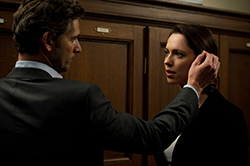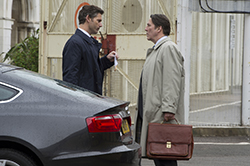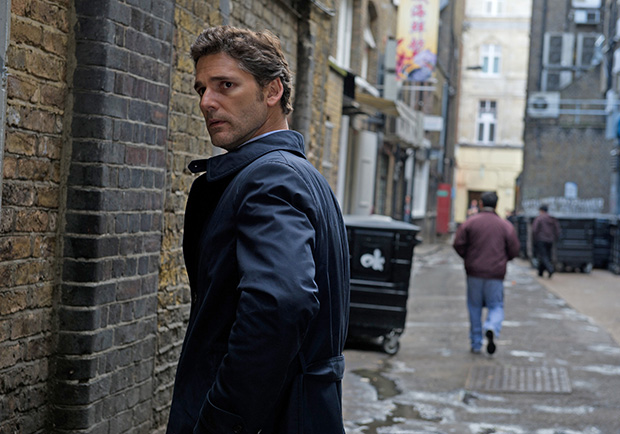Let's start with what Closed Circuit is not.
You may have seen the film's carefully crafted (but spoiler-filled) trailer and its "THEY SEE YOUR EVERY MOVE" poster. And so you might expect it to be an examination of the psychological and sociological effects of living in a surveillance society. It's not. If you want to revisit The Conversation, The Lives of Others, or The Unbearable Lightness of Being, head to the video store this weekend, not the multiplex.
And it's not a ripped-from-the-headlines political debate about how valid or effective it is for governments to hold secret trials and use intelligence agencies to police their own citizens while trying to curb domestic terrorism threats. It's trying to be that—but ultimately all its political machinations are a setting for a rote legal mystery/thriller, not a fresh twist.
 Jay Maidment / Focus Features
Jay Maidment / Focus FeaturesEric Bana and Rebecca Hall play a pair or former lovers who, in a coincidence suspicious to even themselves, are both appointed to defend the man accused of masterminding a terrorist bombing in London. Because of national security concerns, some of the evidence must be presented in a private, sealed court. Claudia Simmons-Howe (Hall) must represent the defendant in the closed sessions. Martin Rose (Bana) is the barrister for the public parts of the trial. They take an oath to have no contact with one another, nor to collude in any way.
The film's biggest weakness is the way it stacks the deck by making one side of the political arguments into self-aware perpetrators of evil. Even those who share the film's core political convictions (and I do) can't help but be put off by how those who represent the government and its practices are portrayed (and I was). Jim Broadbent plays an Attorney General made up, oddly, to look so much like Salman Rushdie that one wonders if this resemblance is intentional. On the radio, he preaches fairness and transparency in the courts, while simultaneously trying to protect state secrets by making sure a presumably innocent man gets convicted.
He lazily threatens the two barristers if they get too close to the truth. He stops two inches short of twirling his mustache like a fascist, Indo-British version of Snidely Whiplash.
Meanwhile, Ciarán Hinds keeps hanging around Martin long enough to suggest his character has some important role to play in the film, if not the course case. He may either be the voice of experience and reason or someone who is hiding his own personal agenda. If it takes you as long as Martin to figure out which, you are either incredibly optimistic about human nature or haven't watched very many spy thrillers. It doesn't help the film, either, that it portrays the political villains as capable of being smart enough to create and sustain vast conspiracies but just dumb enough to make a slip of the tongue in time to reveal their true colors to their attentive subordinates. (I call that movie paradox the Jessup Syndrome, after Jack Nicholson's character in A Few Good Men.)
 Jay Maidment / Focus Features
Jay Maidment / Focus FeaturesThat said, there are some good points. Form reinforces content: the film judiciously but sparingly integrates video footage or non-traditional blocking to create a voyeuristic mood. For instance, Claudia is filmed in her apartment through a door to another room. When she turns the corner, the camera remains stationary, waiting for her to return. In a scene at a soccer match, Claudia and Martin are shot in close up, but through a metal grate.
Most movies track actors around corners or only rarely let objects into the space between the camera and the actors, so these shots make viewers suddenly aware of the camera, as though we are not watching a movie but spying on real people. Of course, this isn't revolutionary: The Bling Ring did much the same thing earlier this summer. But it's used judiciously here, and so it subtly reinforces the experience of those being spied upon. Most of the time, we aren't even aware of the technology around us—until a sudden sound or movement or light or feeling pushes that which we've relegated to scenery into the front of our minds.
The film also uses multiplying split screens, cleverly pointing out that technology creates new problems while solving others. With the proliferation of information comes the need for focus. As a tragedy comes near, our anxiety increases because we don't know where to direct our attention. There are simply too many recordings and too much information. We can't process it quickly enough to act.
 Jay Maidment / Focus Features
Jay Maidment / Focus FeaturesClosed Circuit's other smart choice was in refusing to glorify its two lead characters. Martin is a bit naïve, a bit in over his head. Claudia seems so concerned about not being slighted because she is a woman that she is blind to the ways in which she is more easily manipulated by those who know which buttons to push. Too often in films with a political setting, the moral compromises or failings of one side are glossed over as being insignificant compared to the opposition. They rarely say it overtly, but these films would have us say, "Hey, they may be liars and adulterers, but at least they're not committing real sins, like conspiracy and murder."
By contrast, Closed Circuit is true to life in this way: it reinforces the strong moral lesson that the effects of our wrongdoing don't always line up with the depravity of our motivations in committing them. People can be hurt as much by our individual greed, laziness, ambition, or pride as they are by our corporate nationalism or race hatred.
There comes a moment when the "heroes" openly contemplate simply capitulating to power so they can return to their lives of (relative) comfort and (relative) privilege. What saves them is less the courage of their convictions and more, perhaps, the residue of moral boundaries not yet been blurred into non-recognition. We're probably not inspired by these characters to be better people, but we are reminded through them of how much harder it is to stand by our principles in life's biggest moments when we haven't had much practice doing so day to day.
Caveat Spectator
Closed Circuit is rated R primarily because it uses a spattering of vulgar language, including the magic "F" word more than once. (I counted two instances, but I could have missed one.) There is one big explosion and at least two instances of a woman being physically assaulted by a man. In terms of degree of explicitness, what we actually see is less graphic than an average episode of Criminal Minds or Bones. Some of the characters drink alcohol at a dinner party. Younger viewers may be bored—it's a very talky film—but if the viewer's primary concern is explicit content, this film is relatively tame by contemporary standards. It is stated that two of the characters have had an extramarital affair, but there is no on-screen sex or nudity. (Hall's character is shown in a slip and skirt while changing for a court appearance.)
Kenneth R. Morefield, is an Associate Professor of English at Campbell University. He is the editor of Faith and Spirituality in Masters of World Cinema, Volumes I & II, and the founder of 1More Film Blog.












